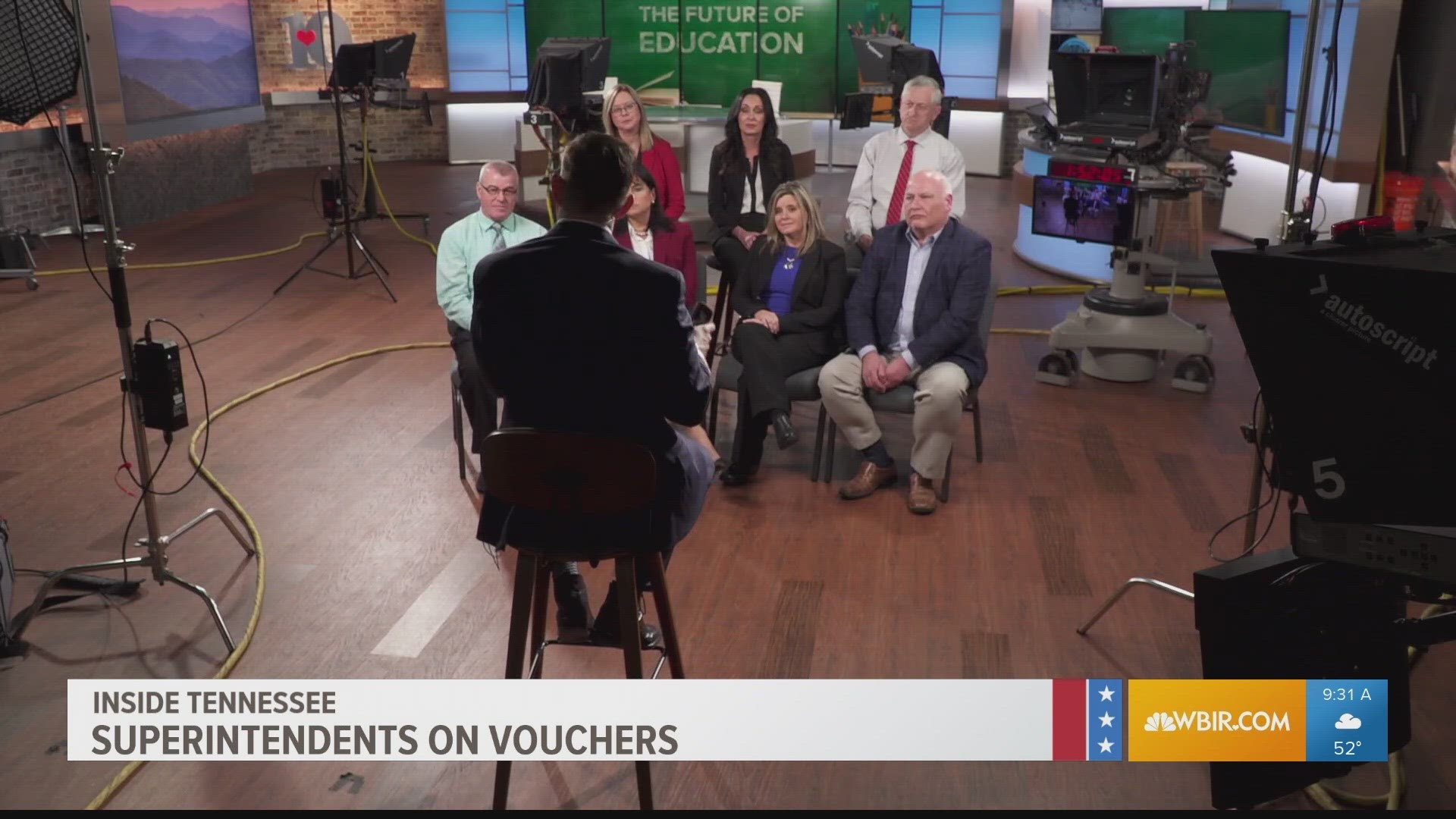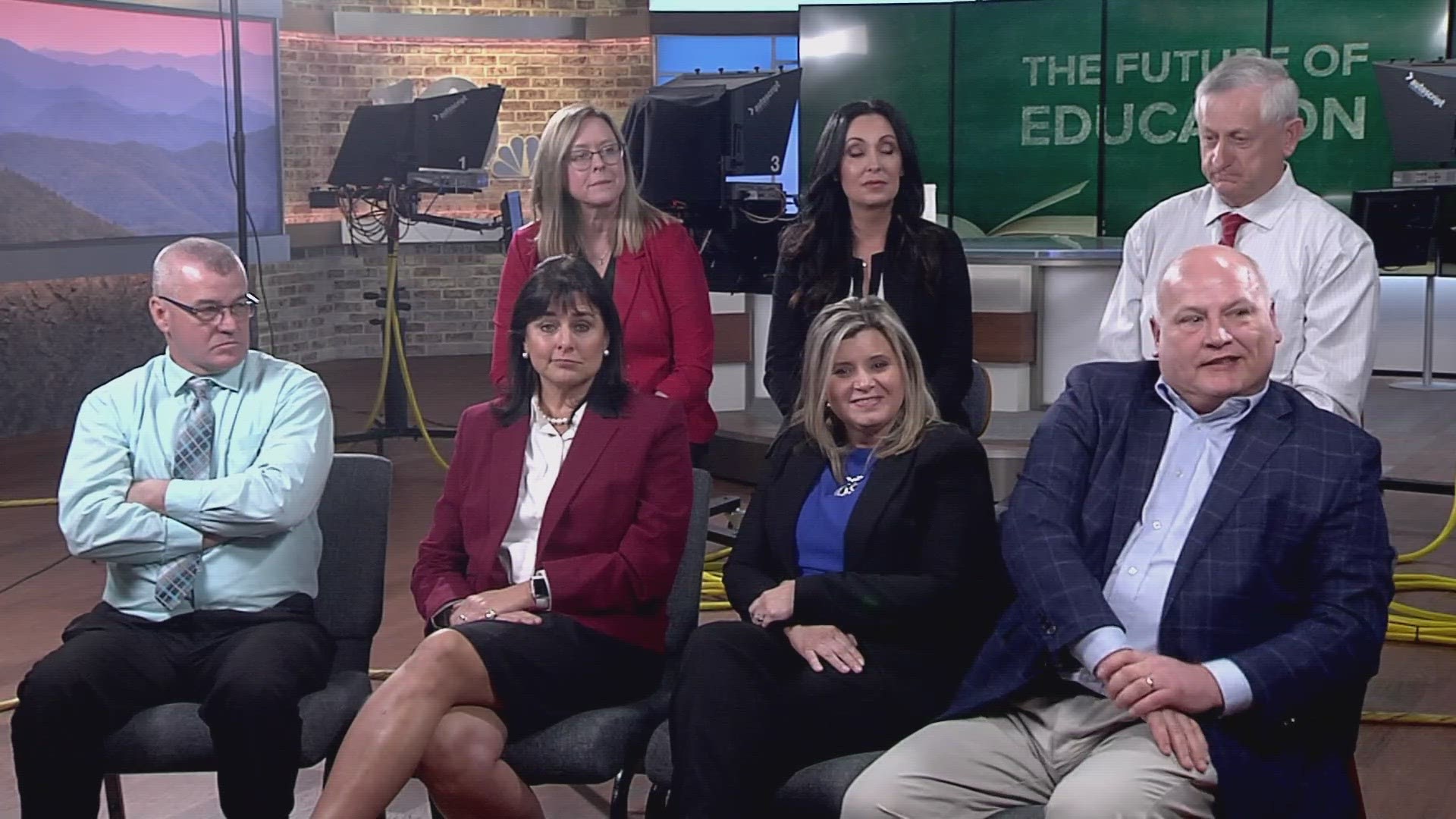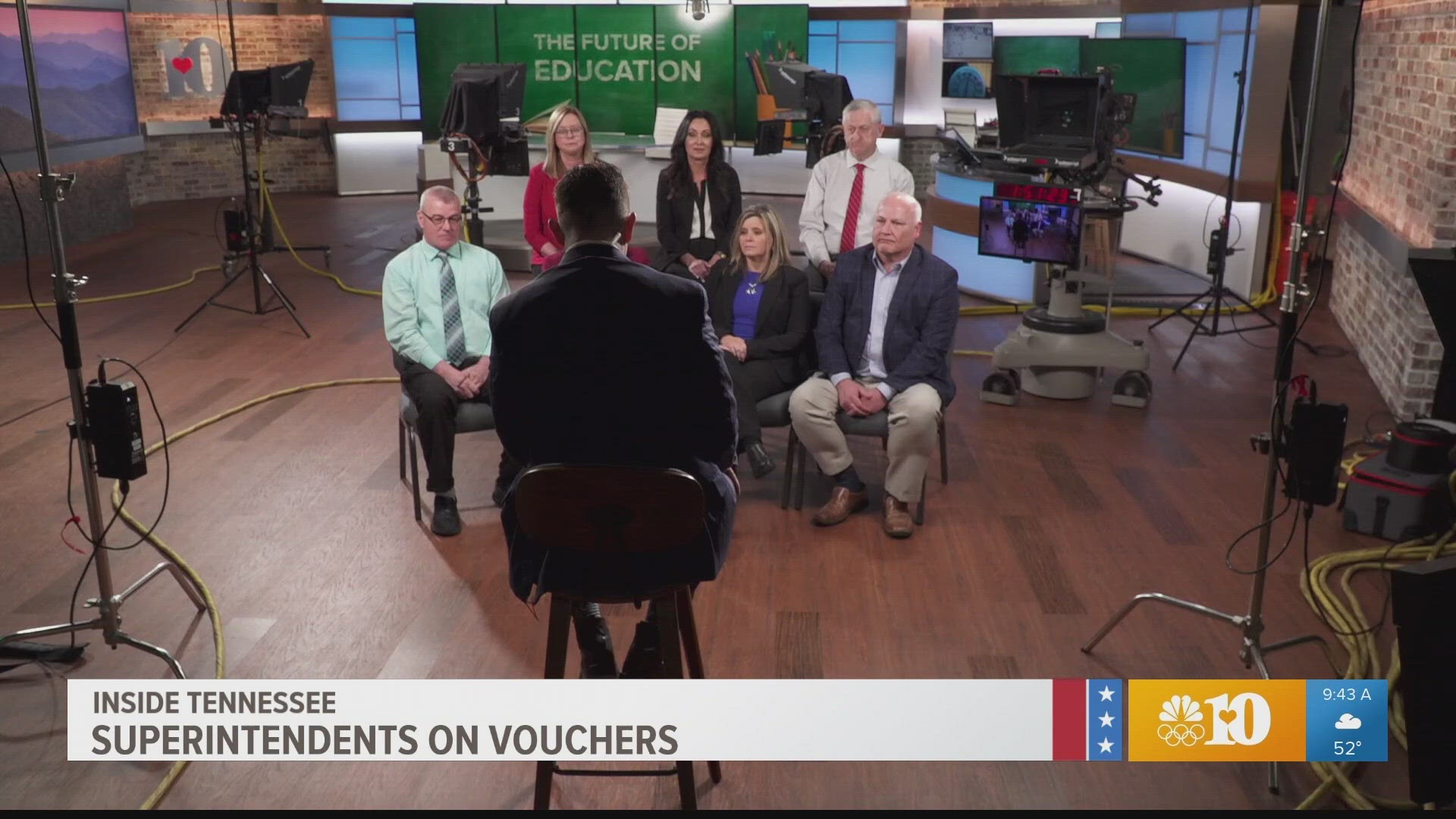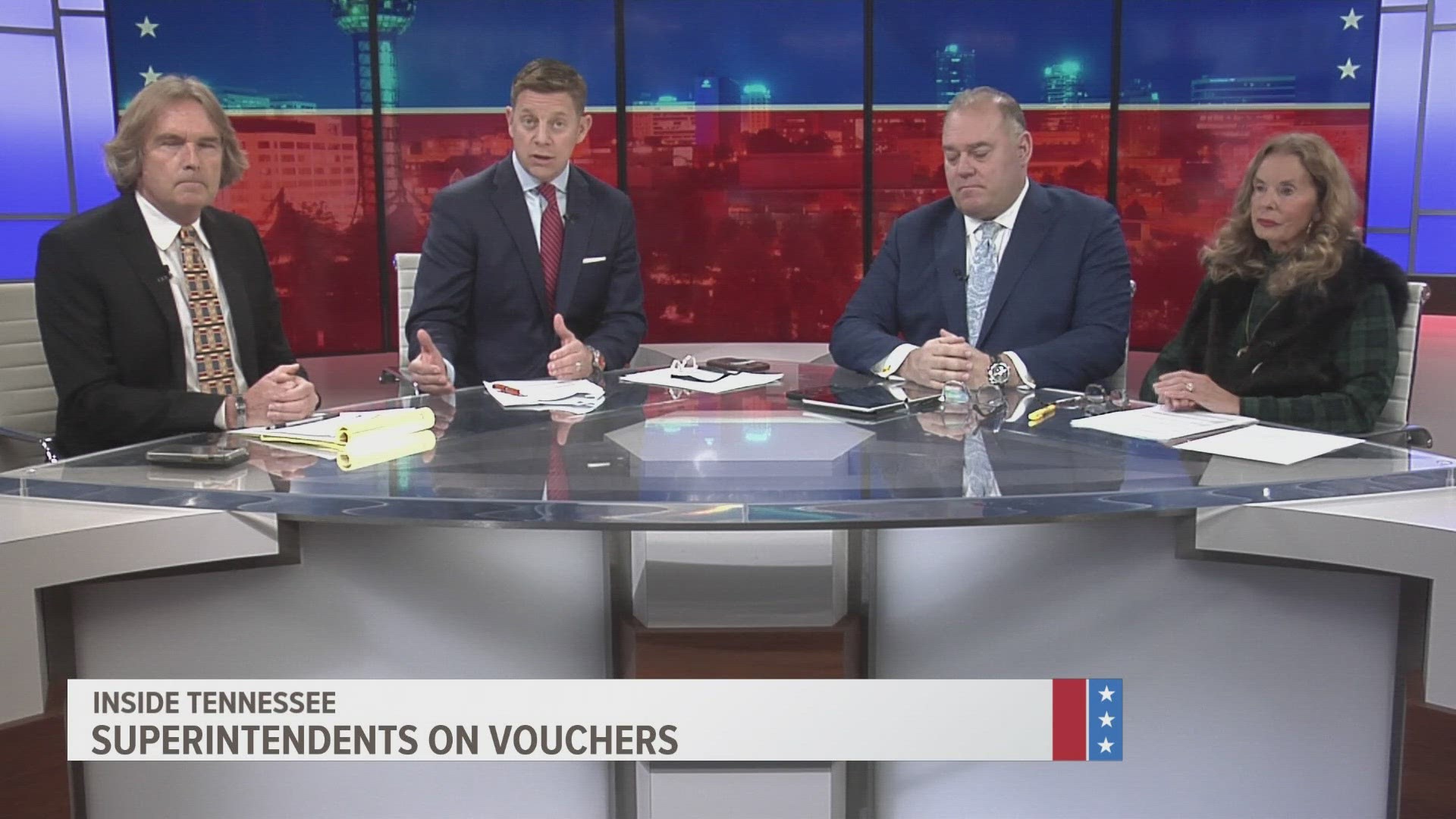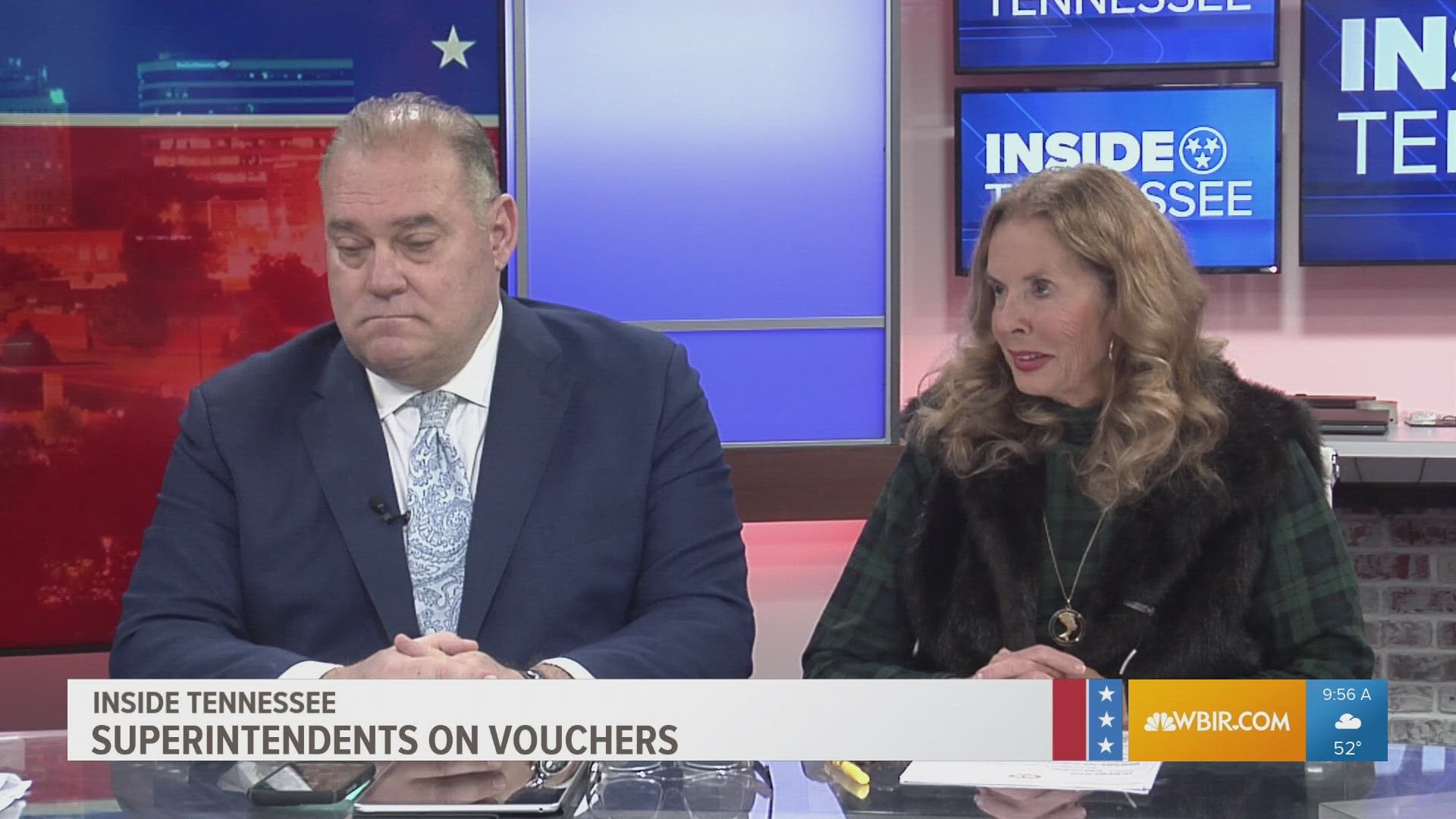KNOXVILLE, Tenn. — WBIR sat down last week with seven district superintendents across East Tennessee to discuss Gov. Bill Lee's Education Freedom Act, which if passed would allow 20,000 students to receive $7,000 to spend on private school tuition, transportation and textbooks.
All seven of the superintendents strongly oppose Lee's school voucher plan.
They say it'll harm public education, lacks accountability and has proved a failure in other states where it's been tried. They say the ultimate beneficiaries include the private schools themselves and their financial backers.
Lee, and supporters, tout vouchers as a way to give parents more choices about where to educate their kids. Legislative leaders including Tennessee House Speaker Cameron Sexton and Lt. Gov. Randy McNally have expressed support for such a plan.
Last week, a resolution opposed to vouchers failed before the Knox County Board of Education because of a tie vote, 4-4.
We invited 27 heads of schools in our viewing area to participate in last week's roundtable. Newport City Schools Superintendent Justin Norton hoped to attend but had to cancel because of illness.
Collectively, the seven superintendents who spoke with us represent over 2,000 teachers and staff along with 23,700 students in Scott, Campbell, Blount and Anderson counties.
WBIR's "Inside Tennessee" included much of what the superintendents said Sunday in its weekly show Feb. 11. You can view that here.
Here's why they say they oppose this plan.
Concerns with funding
"The voucher amount is over $7,000," Mike Winstead, director of Maryville City Schools, said. "Currently in Blount County, Alcoa, Maryville, we get $5,700 per kid from the state. Forty percent of the districts in the state don't even get the voucher amount."
"We are a Title One district," Jeanny Phillips, director of Oneida Special School District, said. "If you pull the state funds, plus the local funds that follows that kid, to a private school that maybe is maybe an hour away, you're pulling our kids out of our community."
"In a rural school district, we are the largest employer in our area," said Jennifer Fields, director of Campbell County Schools. "So, it would have an economic impact on the communities as well."
Rural district challenges
"If we lose 50 students, those 50 students are not gonna come out of one classroom, they're going to come out of 50 different classrooms," Dr. Tim Parrott, director of Anderson County Schools, said. "You still have that same amount of overhead. We're gonna have to decide, 'OK, do I close a small school like Briceville?' It's got 120 students, not because they lost 10 students, but because we lost 50 students overall."
"You close your smaller schools because you have to be able to fund the entire system," Fields said. "When that happens, you are closing schools. And when that happens, you close communities."
"What's gonna happen in rural communities is you're just gonna have small pop-up schools that will last two or three years, and then they won't be able to maintain," Phillips said. "And then they'll go away. And then we're left with the kids that didn't get the education."
Questioning accountability
"Accountability, what we have been told, lies within the parents," said Kelly Johnson, Superintendent of Clinton City Schools. "The parents determine if they're happy, then the program is successful...if a parent chooses to stay in public school, they have to face third-grade retention, fourth-grade adequate growth."
"When they say every minute of our day is scheduled, it is literally every minute of our day," Phillips said. "This is nothing against private schools, but they have the opportunity to attend school, 5 1/2 hours, and then they may go do some some sort of extracurricular activity... So how is that fair?"
"When they (the state) say these vouchers are so that parents can have a choice from failing schools... Well, that failure is by their (the state's) accountability measures," said Rebecca Stone, director of Alcoa City Schools.
"Our teachers have gotten to the point where they ask 'What's next? What else can they put on us?'" Bill Hall, director of Scott County Schools, said. "Well, we don't know, because there's gonna be another measure somewhere down the line. People in our buildings love what they do, and you're taking that love from them because of a test, because of a mandate, because of attendance, because so much has been placed on them."
Concerns about other state voucher programs
"In Arizona, 80 percent of the kids who took the voucher were already in private school," Winstead said. "And the average cost of tuition in Arizona went up by the voucher amount. So you're not making it any more accessible."
"The data shows that school systems in Washington D.C., Milwaukee, and Louisiana have said that students would have scored better if they had remained in public schools as opposed to private schools," Fields said. "The latest results have shown that in Louisiana students have scored worse now with vouchers than they did as a result of Hurricane Katrina, or COVID-19."
"In other states, there has been a gross amount of misuse of funds, because that voucher is not going to go directly to the private school. That voucher goes straight to the parent," Johnson said. "Other states have had massive reports where expensive golf clubs have been bought, expensive ski trips have happened, all in the name of an educational field trip."
What they would say to Gov. Bill Lee
"You've done some great things for our state. This is not great," Hall said. "There's no research to say that it is. Give us the resources we need, so that we can be more successful than we already are."
"If Gov. Lee is sitting in front of me, I'm inviting him to come and spend the day with me in my building, and walk through my classrooms, maybe even teach a class," Stone said. "So that you really see the people that you're going to affect."
"I think, if I have an opportunity to speak to the governor, I'd just plead with him not to play games with our kids," Winstead said. "Not to play politics. Our kids are too valuable."
"If he would just come out say, 'Hey, listen, it's not about what we're going to do for these economically disadvantaged kids. It's about what I'm going to do for my buddies whose kids are already going to private schools, and I'm gonna give them some more money,'" Parrott said. "That's what it's about. Just tell us the truth."
"Look at the homes that these children in rural school districts are living in," Fields said. "Do you want them to stay in a homeschooled environment like that? Would you not rather they come to a school where they can have a hot breakfast, a hot lunch, a snack that can be with people who are going to meet their needs?"
"When he first became governor, he was the only gubernatorial candidate that did not come to see directors of schools," Johnson said. "He did not come to our group to introduce himself, he has really not engaged in public education, except on the outskirts. I don't think any of us have had a personal conversation with him about the challenges that we have and what goes on in the schools."
Knox County Schools, which represents about 60,000 students and is the third largest district in the state of Tennessee, did not attend. Superintendent Dr. Jon Rysewyk provided the following statement.
At KCS, we are committed to preparing every student to excel academically and to graduate ready for their future. Our educators and staff work extremely hard every day to improve academic outcomes for students and I’m proud of the impact we’re making. We are focused on providing a high-quality education for all students and I’m confident that our families recognize this commitment and will continue to choose Knox County Schools.

